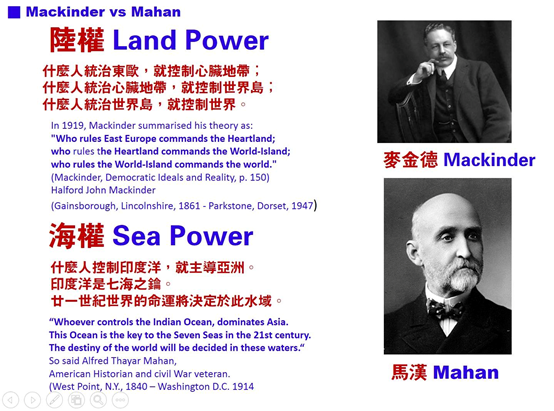Chastised Greece Turns to China
International New York Times, August 28, 2017
http://iht.newspaperdirect.com/epaper/viewer.aspx
accessed August 28, 2017
● Some say that China’s “Belt Road Initiative is only notional”. Really?
有人說北京的「一帶一路」只是紙上談兵。真的嗎?
● Beijing abhors to be perceived as a threat and has actively promoted the idea that the “Belt Road Initiative” is no more than just an “initiative” or a proposal, and definitely is not a strategy.
北京極不願激起國際上的「中國威脅論」。北京「發改會」努力在國際上說明「一帶一路」只不過是個「倡議」,決不是個「戰略」。
Chong-Pin Lin Sept 4, 2017
林中斌 2017.9.4

After years of struggling under austerity imposed by European partners and a chilly shoulder from the United States, Greece has embraced the advances of China, its most ardent and geopolitically ambitious suitor.
While Europe was busy squeezing Greece, the Chinese swooped in with bucket-loads of investments that have begun to pay off, not only economically but also by apparently giving China a political foothold in Greece, and by extension, in Europe.
Last summer, Greece helped stop the European Union from issuing a unified statement against Chinese aggression in the South China Sea. This June, Athens prevented the bloc from condemning China’s human rights record. Days later it opposed tougher screening of Chinese investments in Europe.
Greece’s diplomatic stance hardly went unnoticed by its European partners or by the United States, all of which had previously worried that the country’s economic vulnerability might make it a ripe target for Russia, always eager to divide the bloc.
Instead, it is the Chinese who have become an increasingly powerful foreign player in Greece after years of courtship and checkbook diplomacy.
Among those initiatives, China plans to make the Greek port of Piraeus the “dragon head” of its vast “One Belt, One Road” project, a new Silk Road into Europe.
When Germany treated Greece as the eurozone’s delinquent, China designated a recovery-hungry Greece its “most reliable friend” in Europe.
“While the Europeans are acting towards Greece like medieval leeches, the Chinese keep bringing money,” said Costas Douzinas, the head of the Greek Parliament’s foreign affairs and defense committee and a member of the governing party, Syriza.
China has already used its economic muscle to stamp a major geopolitical footprint in Africa and South America as it scours the globe for natural resources to fuel its economy. If China was initially welcomed as a deep-pocketed investor — and an alternative to the United States — it has faced growing criticism that it is less an economic partner than a 21st-century incarnation of a colonialist power.
If not looking for natural resources in Europe, China has for years invested heavily across the bloc, its largest trading partner. Yet concerns are rising that Beijing is using its economic clout for political leverage. Mr. Douzinas said China had never explicitly asked Greece for support on the human rights vote or on other sensitive issues, though he and other Greek officials acknowledge that explicit requests are not necessary.
“If you’re down, and someone slaps you, and someone else gives you an alm,” Mr. Douzinas said, “when you can do something in return, who will you help, the one who helped you or the one who slapped you?”
The Trump administration, recognizing it has a geopolitical and economic challenger, recently intervened to help lift an American deal over a Chinese competitor — and the Greeks seemed happy to play one power off the other.
European Union officials are concerned that China is buying silence on human rights issues and undermining the bloc’s ability to speak with one voice. Analysts say China targets smaller countries in need of cash, among them Spain, Portugal and others that suffered in the financial crisis. Hungary, where China is pledging to spend billions on a railway, also blocked the European Union statement on the South China Sea.
Many analysts have noted that Greece’s human rights veto came as Prime Minister Alexis Tsipras returned from a summit meeting in Beijing in May, where he signed billions of euros’ worth of new investment memorandums with Chinese companies.
Greek officials insisted that, despite all the Chinese investments, the country identified with, and was loyal to, the European Union and did not do China’s bidding. Some European officials are not so sure.
“The Greek government needs to choose where its alliances lie and realize the E.U. is not only a market, but first and foremost a community of values,” said Marietje Schaake, a prominent member of the European Parliament from the Netherlands.
Over the summer, Chancellor Angela Merkel of Germany tightened rules to limit takeovers of German strategic assets, a move aimed at Chinese statebacked firms. As Ms. Merkel put it to a German newspaper after Greece’s vote blocking the condemnation of Chinese human rights violations, Europe “has to speak with China in one voice.”
She added that China’s economic might allowed it to pressure weaker European nations. “Seen from Beijing,” she added, “Europe is an Asian peninsula.”
A GATEWAY TO EUROPE
In January 2015, Greek voters shook Europe by electing the radical leftist party Syriza and its leader, Mr. Tsipras. He had campaigned to end the austerity measures of the European Union and halt privatizations like the port of Piraeus. Boisterous protesters spilled into Athens, waving Syriza flags and denouncing the European power centers, Brussels and Berlin.
But it was Beijing that became quietly nervous. China’s years of laborious and expensive spadework in Greece suddenly seemed imperiled, especially its investments in Piraeus.
Immediately after Mr. Tsipras took office, the Chinese ambassador, Zou Xiaoli, became the first foreign official to pay him a visit. Mr. Zou pressed Mr. Tsipras to honor the previous Greek government’s commitments to privatize Piraeus, according to several people with knowledge of the meeting.
Back in Beijing, Chinese officials expressed displeasure, and the state-run news media ran articles questioning Greece’s friendship with China. Less than a week later, the Chinese premier, Li Keqiang, telephoned Mr. Tsipras to make sure there were no more misunderstandings.
In response, Mr. Tsipras and his deputies announced an “upgrading of relations between Greece and China.” Within weeks, three Chinese frigates arrived in Piraeus. At a ceremony, Mr. Tsipras affirmed Greece’s intent to “serve as China’s gateway into Europe.”
Even as Berlin and Brussels grow wary of Chinese investment, Greece may not care, after suffering under German-enforced austerity attached to the international bailouts that have kept the country afloat since the 2010 debt crisis.
In 2010, as creditors demanded the gutting of pensions and sharp tax increases, the Chinese offered to buy toxic Greek government bonds. In 2013, as Greece became increasingly subject to creditor budget restrictions, the Chinese spent freely on Greek assets.
In turn, Greece has sometimes been a voice in the room at the European Union for China on sensitive issues — although government officials insist Greece remains loyal to the bloc and to NATO, and is only seeking to strike a balance in a shifting world.
As for scuttling the European Union statement on China’s human rights violations — the first time in a decade the bloc was silenced — government officials said Greece viewed the Union’s approach as “unproductive.” After the vote, China’s Foreign Ministry applauded “the relevant E.U. country for sticking to the right position.”
‘A KIND OF NEOCOLONIALISM’
Along more than 20 miles of coastline outside Athens, a forest of cranes at the Piraeus port load and unload thousands of containers from China and around the world. An ultramodern floating dock is scheduled for arrival in November from China. A planned Chinese-financed passenger hub is also in the works.
China has transformed Piraeus into the Mediterranean’s busiest port, investing nearly half a billion euros through the state-backed shipping conglomerate Cosco.
Under the One Belt, One Road project, Chinese goods would travel along a new network of railways and roads radiating up through Central European nations, with the prized destination being Germany, where China invested $12 billion last year alone.
In the middle of the port, Chinese, Greek and European Union flags flutter in front of the headquarters of Cosco, which now controls the entire waterfront through its 67 percent stake in the port.
“It’s a kind of neocolonialism without the gunboats,” Mr. Douzinas said with a chuckle.
Cosco has brought around 1,000 jobs to the area, but it has outfitted cargo docks with cranes made in China, not in Greece, and expanded the docks with building materials from China. And as Greece struggles through record joblessness, the company has used subcontractors to hire around 1,500 workers mostly on short-term contracts at wages far below what unionized Greek dockworkers are paid.
Yet Greece needs any jobs, and leaders are counting on more Chinese investment. Fosun International Holdings, a Chinese conglomerate run by Guo Guangchang, often referred to as China’s Warren Buffett, is spending billions of euros through a consortium with Greek and Arab investors to convert an abandoned airport on the seaside outside Athens into a posh playground three times the size of Monaco for moneyed tourists.
The project, Hellenikon, is part of a bigger plan to bring over 1.5 million Chinese tourists to Greece during the next five years.
Mr. Tsipras has swept aside regulatory hurdles, clearing two large refugee camps installed in the former airport and quashing attempts by members of his own party to delay construction because of concerns the project might pave over ancient archaeological sites.
“That also has been unstuck,” said Dimitri B. Papadimitriou, the Greek economy minister.
CHINA VS. AMERICA
After World War II, the benefactor showering millions on Greece was the United States, courtesy of the Marshall Plan. America’s role in Greece wasn’t always popular — especially its support for the country’s military dictatorship during the Cold War — but the United States was regarded as the gold standard for economic opportunity. Not so much anymore.
When former President Obama visited Greece last November on his final foreign trip, some Syriza officials, bitter that his administration had not intervened more forcefully during the financial crisis, mocked his speech as a funeral oration for his own legacy, worthy of Pericles.
Privately, Mr. Obama’s advisers said the trip also served to demonstrate, somewhat belatedly, American engagement in Greece in the face of Russian meddling in the region.
But it was China that was most deeply entrenched. Eliot Engel, the ranking member of the House Foreign Affairs Committee, described a “free-for-all for rogue countries” in Greece.
“We see it with Russia, and we see it with China,” he said as he attended an Independence Day party on July 4 at the United States ambassador’s residence in Athens.
Mr. Tsipras is trying to play both sides. Having traveled twice in a year to Beijing to meet the Chinese president and attend One Belt, One Road forums to draw investment, he has recently welcomed American businessmen and promoted Greece’s recovery to American lawmakers.
In May, when Fosun and two other Chinese companies bid to take over a major Greek insurer, the United States commerce secretary, Wilbur L. Ross, intervened to help push the deal into the hands of Calamos Investments, a GreekAmerican consortium whose chief executive is a backer of President Trump. The Exin Group, a Dutch partnership with Calamos, eventually won the bid.
“He sent us a letter asking us to look at Calamos,” said Mr. Papadimitriou, the economy minister. Any deal, Mr. Ross implied in the letter, “could be the beginning of more investments in Greece,” Mr. Papadimitriou recalled.
Some Greek government officials cited Fosun’s defeat as evidence that Athens was not under China’s sway.
“We are sensitive to being viewed as someone else’s colony,” said Panagiotis Kouroumblis, Greece’s maritime minister. “Nothing can move forward without the agreement of the Greek state.”
































